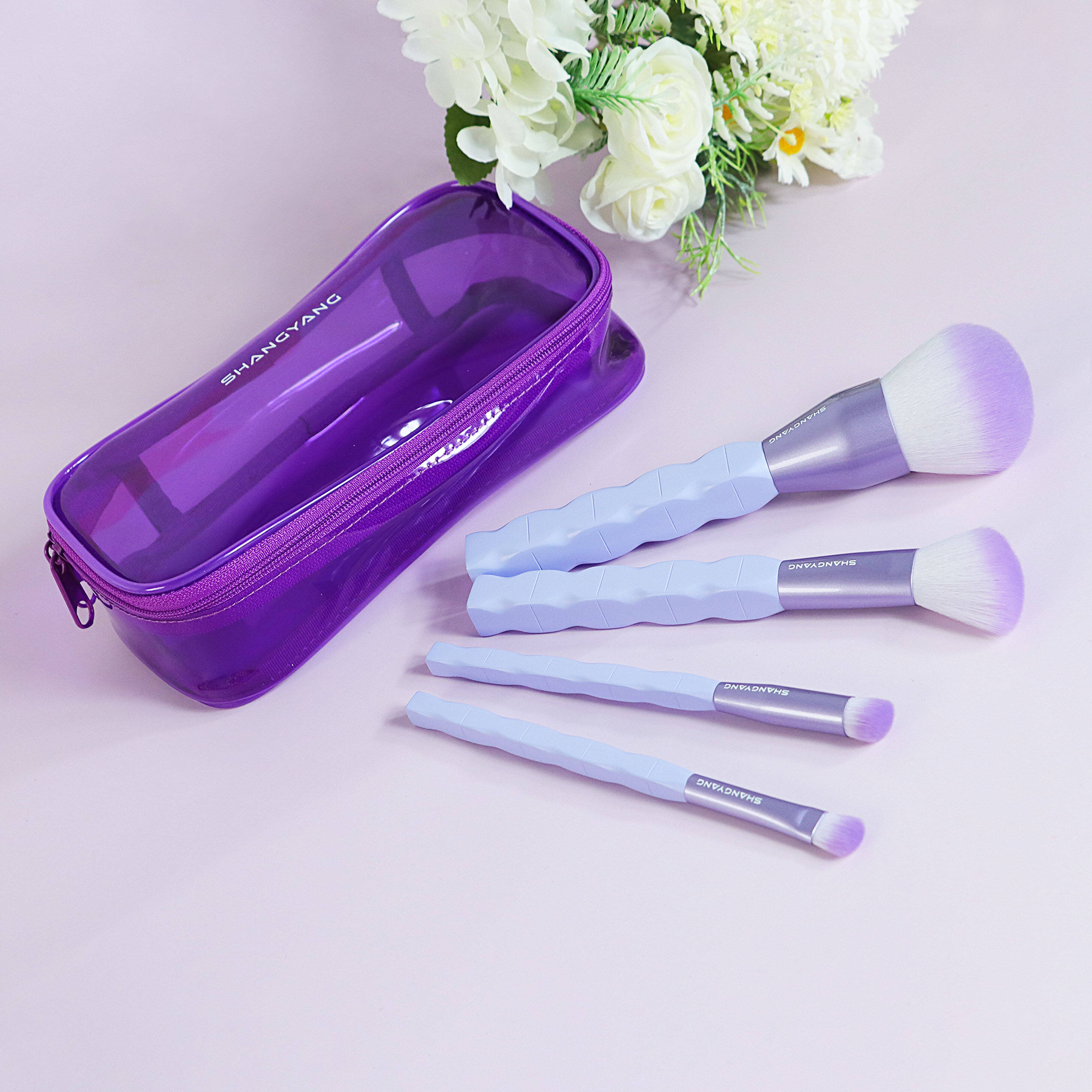뷰티 및 스킨케어 산업은 계속해서 빠르게 진화하고 있으며, 이로 인해 신뢰할 수 있는 제조업체를 선택하는 것이 그 어느 때보다 중요해지고 있습니다. 얼굴 붓 고품질의 페이셜 브러시는 일상적인 스킨케어 루틴에서 필수 도구가 되었으며, 소비자 기대에 부합하는 프리미엄 제품을 공급할 수 있는 제조업체에 대한 수요가 증가하고 있습니다. 올바른 페이스 브러시 제조업체는 귀하의 브랜드 성공 여부, 제품 품질 및 고객 만족도에 상당한 영향을 미칠 수 있습니다.
페이셜 브러시 제조 분야에 진입할 때, 모든 제조업체가 동일한 기준이나 역량으로 운영되는 것은 아니라는 점을 인지하는 것이 중요합니다. 귀사의 페이셜 브러시 제조업체 선택은 제품의 내구성과 성능은 물론 시장 경쟁력과 브랜드 평판에까지 영향을 미칠 것입니다. 본 포괄적인 가이드에서는 페이셜 브러시 라인의 제조 파트너를 선정할 때 고려해야 할 핵심 요소들을 살펴봅니다.
평판 좋은 페이스 브러시 제조업체는 귀하의 비즈니스 요구에 부합하는 강력한 생산 역량을 보유하고 있어야 합니다. 월 최대 생산량, 수요 급증 상황에서의 대응 능력, 생산 라인의 유연성 등을 고려해야 합니다. 이상적인 제조업체는 다양한 브러시 유형에 전문화된 복수의 생산 라인을 보유하고 있으며, 귀사의 비즈니스 성장에 따라 운영 규모를 확장할 수 있는 능력을 갖추고 있어야 합니다.
현대식 제조 시설은 필요한 경우 숙련된 수작업 공정과 함께 자동화 시스템을 갖추고 있어야 합니다. 이러한 조합은 고품질 제품의 핵심 요소인 장인 정신을 유지하면서도 일관된 품질을 보장합니다. 생산 설비의 노후 정도와 상태, 그리고 유지보수 절차를 평가해야 하는데, 이는 생산의 신뢰성에 직접적인 영향을 미치기 때문입니다.
선도적인 페이스 브러시 제조업체들은 지속적인 소재 연구와 혁신을 통해 업계 트렌드를 앞서 나갑니다. 이들 업체는 합성 섬유에서부터 특수 항균 옵션에 이르기까지 다양한 털 소재에 대한 폭넓은 지식을 제공해야 합니다. 제조업체의 전문성은 제품 내구성을 높이는 손잡이 소재, 코팅 기술 및 방수 솔루션 분야까지 확장되어야 합니다.
자재 공급업체와 긴밀한 관계를 유지하고 자재 조달 방식에 대해 상세한 정보를 제공할 수 있는 페이스 브러시 제조업체를 찾아보세요. 목표 시장, 가격대 및 특정 제품 요구사항에 따라 최적의 소재를 추천할 수 있어야 합니다. 소재 선택에서의 혁신은 귀하의 제품이 시장에서 경쟁 우위를 갖도록 도와줄 수 있습니다.
우수한 브러시 제조업체는 생산 과정의 모든 단계에서 포괄적인 품질 관리 조치를 시행합니다. 여기에는 원자재 입고 검사, 공정 중 품질 점검 및 최종 제품 테스트가 포함됩니다. 제조업체는 품질 관리 절차에 대한 상세한 문서를 보유하고 있어야 하며, 고객과 이러한 프로토콜을 공유할 의향이 있어야 합니다.
정기적인 테스트에는 다양한 사용 조건에서의 강모 유지력, 색상 견뢰도, 내수성, 내구성 등이 포함되어야 합니다. 제조업체는 필요한 경우, 특히 항균 브러시 제품에 대해 미생물학적 테스트도 수행해야 합니다. 자체 테스트 시설을 운영하고 외부 테스트 실험실과 협력하는 파트너를 찾으십시오.
인증 기준은 제조업체의 품질 및 안전에 대한 약속을 객관적으로 보여주는 지표 역할을 합니다. 필수 인증에는 품질 경영 시스템을 위한 ISO 9001, 환경 경영을 위한 ISO 14001, 그리고 특정 화장품 제조 관련 인증이 포함될 수 있습니다. 얼굴 브러시 제조업체는 또한 관련 지역의 안전 기준 및 규정을 준수해야 합니다.
기본적인 인증 외에도 귀하의 타겟 시장과 관련된 특화된 자격을 취득한 제조업체를 고려해 보세요. 여기에는 유기농 인증, 동물 실험 금지(크루얼티 프리) 인증, 또는 특정 국가별 승인 등이 포함될 수 있습니다. 이러한 추가 인증은 제품의 시장성 강화와 품질에 대한 책임감을 입증하는 데 도움이 됩니다.
잠재적 페이스 브러시 제조업체의 전체 비용 구조를 이해하는 것은 비즈니스 계획 수립에 있어 매우 중요합니다. 단가뿐 아니라 금형 비용, 설치 수수료 및 최소 주문 수량(MOQ)도 고려해야 합니다. 투명한 제조업체는 모든 관련 비용에 대한 상세한 내역을 제공하고, 주문량에 따라 달라지는 가격 체계를 설명해 줄 것입니다.
최저 가격만을 우선적으로 찾는 것이 매력적으로 느껴질 수 있지만, 총 소유 비용(total cost of ownership)을 고려해야 합니다. 여기에는 품질 일관성, 불량률, 그리고 잠재적인 보증 청구와 같은 요소들이 포함됩니다. 신뢰할 수 있는 페이스 브러시 제조업체로부터 약간 더 높은 초기 비용을 지불하더라도, 장기적으로 문제와 고객 불만이 줄어들기 때문에 더 나은 가치를 얻을 수 있습니다.

제조업체의 지불 조건과 재무적 유연성을 평가하십시오. 일반적인 업계 관행은 초기 주문 시 선금을 받고, 선적 전에 잔액을 지불하는 것입니다. 그러나 장기 파트너십의 경우 설립된 제조업체가 더 유리한 조건을 제공할 수도 있습니다. 제조업체의 재정 안정성 또한 동일하게 중요하며, 이는 일관된 생산 능력과 신뢰할 수 있는 비즈니스 운영을 보장합니다.
해당 기업의 사업 역사, 신용등급 및 시장 평판을 조사하십시오. 재정적으로 안정적인 페이스 브러시 제조업체는 기술 개선에 투자하고 품질 기준을 유지하며 귀하의 성장 계획을 지원할 가능성이 더 높습니다. 또한 시장 변동에도 불구하고 서비스 수준을 유지할 수 있는 능력을 입증해야 합니다.
효과적인 소통은 성공적인 제조 파트너십의 핵심입니다. 잠재적 제조업체의 응답성, 의사소통의 명확성 및 문제 해결에 대한 의지 여부를 평가하십시오. 제조업체는 생산 현황에 대해 정기적으로 업데이트를 제공하고, 문제가 발생할 경우 즉시 알리며, 전반적인 협력 기간 동안 투명한 대화를 유지해야 합니다.
귀하의 비즈니스 요구 사항을 이해하고 선호하는 언어로 효과적으로 소통할 수 있는 전담 계정 관리자를 보유한 얼굴 브러시 제조업체를 찾아보세요. 이들은 개선 사항을 능동적으로 제안하고 문제를 해결함으로써 귀하의 성공에 대한 헌신을 보여줘야 합니다.
최고의 얼굴 브러시 제조업체는 맞춤형 제품 개발에 강력한 지원을 제공합니다. 귀하의 아이디어를 양산 가능한 제품으로 구현할 수 있는 경험이 풍부한 디자인 팀을 보유하고 있어야 하며, 기술적 조언, 프로토타입 제작 서비스 및 제품 성능과 비용 효율성을 극대화하기 위한 재료 선택 가이드를 제공해야 합니다.
그들이 기밀유지계약(NDA) 체결에 얼마나 적극적인지를 평가하고, 귀하의 지적 재산권을 보호할 수 있는지를 확인하십시오. 신뢰할 수 있는 제조업체는 개발 과정 전반에 걸쳐 독점 정보를 처리하고 기밀을 유지하기 위한 명확한 절차를 마련하고 있어야 합니다.
일반 주문의 경우 리드타임은 주문량과 복잡성에 따라 대개 30~45일 정도 소요됩니다. 맞춤형 디자인은 금형 제작 및 승인 절차로 인해 추가 기간이 필요할 수 있습니다. 설립된 면용 브러시 제조업체들은 일반적으로 반복 주문 시 리드타임을 단축하기 위해 공통 소재의 여유 재고를 확보하고 있습니다.
샘플 제품을 요청하여 평가하고, 인증 서류를 검토하며 가능하면 공장 감사를 진행하십시오. 현재 고객으로부터의 추천서를 요청하고 업계 내 실적을 확인하십시오. 많은 신뢰할 수 있는 제조업체는 시설 방문 및 품질 관리 검사를 환영합니다.
포괄적인 제조 계약서에는 품질 기준, 가격 조건, 지적 재산권 보호, 최소 주문 수량, 납기 시간 및 보증 조항이 포함되어야 합니다. 또한 품질 관리 절차, 시험 요구 사항 및 잠재적 분쟁 해결 절차를 명시해야 합니다.
분기별로 정기적인 성과 평가를 실시하여 품질 일관성, 납기 준수율, 의사소통 효율성 및 비용 경쟁력을 평가하십시오. 정기적인 평가는 높은 수준을 유지하고 제조 파트너십 개선이 필요한 영역을 파악하는 데 도움이 됩니다.